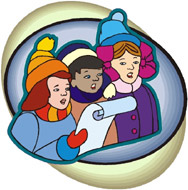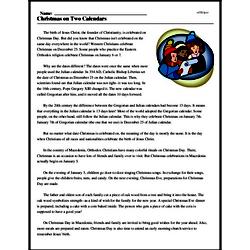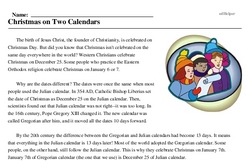Christmas on Two Calendars
Christmas
Reading Comprehension for December 25
The birth of Jesus Christ, the founder of Christianity, is celebrated on Christmas Day. But did you know that Christmas isn't celebrated on the same day everywhere in the world? Western Christians celebrate Christmas on December 25. Some people who practice the Eastern Orthodox religion celebrate Christmas on January 6 or 7.
Why are the dates different? The dates were once the same when most people used the Julian calendar. In 354 AD, Catholic Bishop Liberius set the date of Christmas as December 25 on the Julian calendar. Then, scientists found out that Julian calendar was not right--it was too long. In the 16th century, Pope Gregory XIII changed it. The new calendar was called Gregorian after him, and it moved all the dates 10 days forward.
By the 20th century the difference between the Gregorian and Julian calendars had become 13 days. It means that everything in the Julian calendar is 13 days later! Most of the world adopted the Gregorian calendar. Some people, on the other hand, still follow the Julian calendar. This is why they celebrate Christmas on January 7th. January 7th of Gregorian calendar (the one that we use) is December 25 of Julian calendar.
But no matter what date Christmas is celebrated on, the meaning of the day is mostly the same. It is the day when Christians of all races and nationalities celebrate the birth of Jesus Christ.
In the country of Macedonia, Orthodox Christians have many colorful rituals on Christmas Day. There, Christmas is an occasion to have lots of friends and family over to visit. But Christmas celebrations in Macedonia actually begin on January 5.




